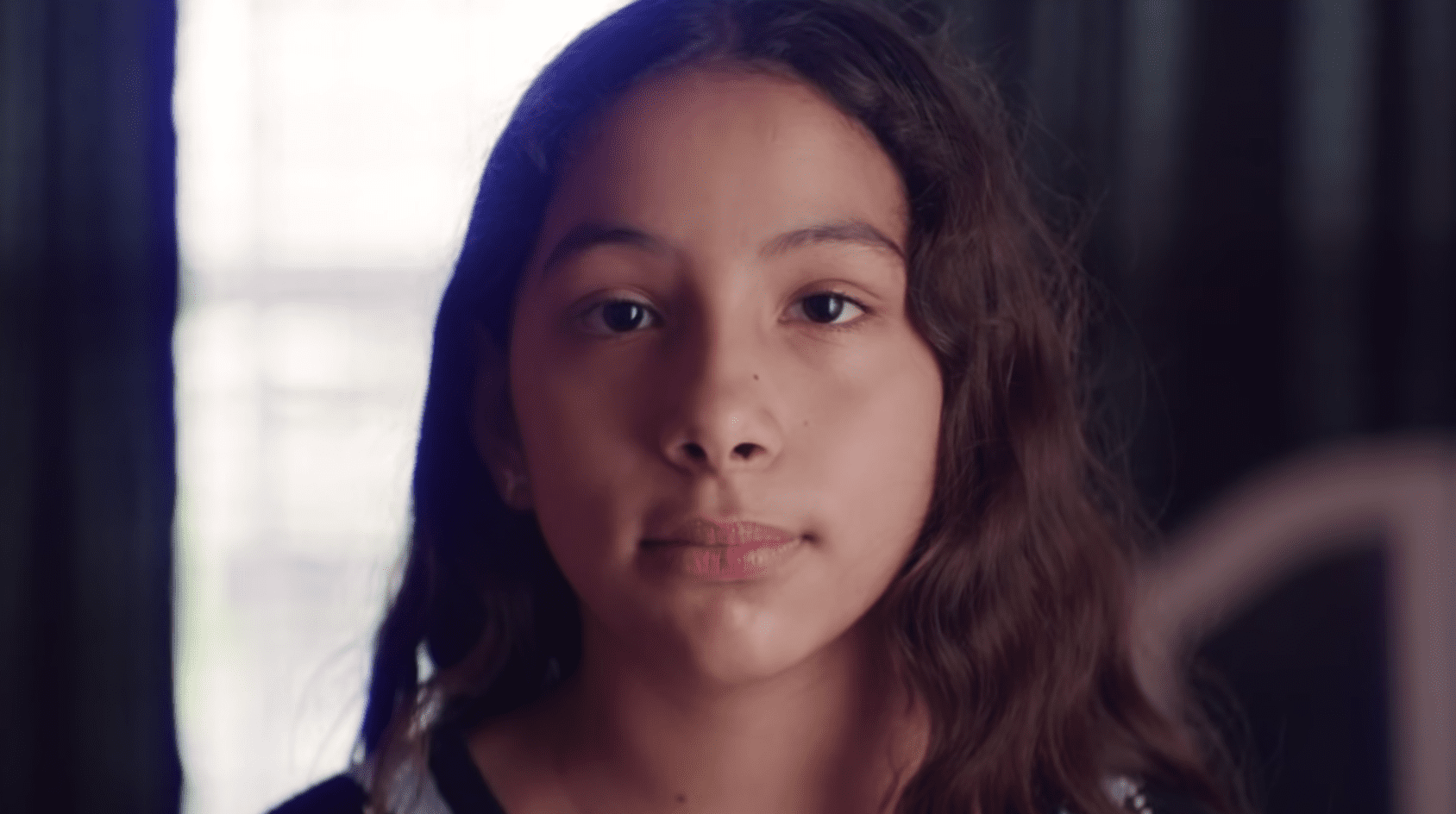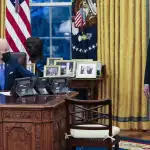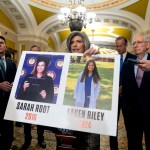Eleven-year-old Estela Juarez looked into the camera and began reading her letter addressed to President Donald Trump.
“My mom is my best friend,” Estela read in a two-minute video broadcast during this week’s Democratic National Convention. “She came to America as a teenager over 20 years ago, without papers, in search of a better life.”
In her letter, Estela explained how her father, a Marine who served in South America, Africa and Iraq, voted for Trump in 2016 because he thought the New York businessman would protect military families. In August 2018, Estela’s mother, Alejandra Juarez, boarded a plane to Mexico as she faced a deportation order under the Trump administration.
“Every day that passes, you deport more moms and dads and take them away from kids like me,” Estela said.
The video of Estela’s emotional and personal letter to the president spotlighted the realities for some families living under the administration’s immigration policies. And it became one of the breakout moments of a virtual convention that some felt did not feature enough Latinx people.
Cathia Sanchez, a 33-year-old mental health specialist in California, saw Estela’s video after a friend sent it to her. She was taken aback.
“I literally watched it over and over again,” Sanchez said. “And every single time, I had a knot in my throat.”
It is one of hundreds of stories that members of the Latinx community have heard and internalized over the years. But this one felt different for Sanchez, who is a Deferred Action for Childhood Arrivals (DACA) recipient. The program is intended to protect immigrants from deportation if they came to the United States as children, but has been challenged in court by the Trump administration.
Estela’s video, which aired Wednesday, was one of several segments during the DNC that highlighted either members of the Latinx community or voices of elected Latinos. But it is Estela’s story that seems to have resonated, becoming widely shared on social media. On Friday, the Biden campaign said the video had nearly one million views on Instagram.
On the same day, a Florida congressman told The 19th that the video had helped encourage some of his colleagues to support an existing bill that could ultimately help Estela’s mother.
Mayra Macías is the executive director of Latino Victory, a political group that works to increase Latino representation in government. She had already read coverage about Estela’s mother, Alejandra. Macías believes the video will introduce new viewers to the case and put another face to family separation under the Trump administration. The video also included images and audio about separations at the U.S. and Mexican border.
Groups that work within the Latinx community think Estela’s story will appeal to a broad group of potential voters.
“I think many of us felt seen and represented,” she said. “Seeing Estela’s story told — and seeing it told in a very compassionate and dignified way — helps remind Democrats, and all of those who were watching the convention, that immigration stories are American stories.”
David Cruz, communications director for the League of United Latin American Citizens, or LULAC, said that the video represented the reality of being a first-generation American in a Latinx household, who often serve as translators for Spanish-speaking parents.
“In a way it felt like she was doing what untold thousands of other children who are bilingual with immigrant parents are asked to do,” he said. “Which is to interpret the story. And I saw her as someone who’s carrying the burden and the responsibility of sharing this very tragic story, and in her own way, convey what it’s doing to her and her family.”
Several outlets have reported on Alejandra Juarez’s story: She first traveled from Mexico City to the Texas border as a teenager. She lied to a Customs and Border Patrol agent that she was a U.S. citizen on the advice of a coyote, a human smuggler. As a Spanish speaker, she signed paperwork in English that would complicate her immigration status in the future. After being in the country for more than a decade, she got on the radar of the U.S. Immigration and Customs Enforcement agency following a 2013 traffic stop. But under the administration of former President Barack Obama, she was considered a low priority for deportation.
That changed after Trump was sworn into office in 2017. She was ordered to leave.
After her mother self-deported in August 2018, Estela soon joined her in Mexico. Estela’s father, Cuauhtemoc “Temo” Juarez, and her teenage sister, Pamela, stayed in central Florida.
Alida Garcia is vice president of FWD.us, an immigration advocacy group that helped the Juarez family before Alejandra Juarez self deported. Garcia grew emotional talking about Estela.
“It was very hard when we lost that case. Me and my team are still not over it. And seeing Estela up there was just a reminder that we have to keep fighting. There is no other choice. And my hope is that for those who don’t live and work this issue every day, that perhaps they felt a little bit more in tuned,” she said. “So that should the opportunity arise to fight for an immigration reform that Americans deserve, that we can make sure that whatever bill that is, that brings Alejandra Juarez home.”
The video of Estela, calmly reading her letter as images of her family flashed on the screen, has stayed with Jose “JB” Barrera, another DACA recipient. The 25-year-old advocates for Latinx issues through LULAC’s California chapter. He said it hit close to home.
“Having immigrant parents and knowing that, any day, a deportation can happen and our lives can change immediately,” he said. “That was really impactful.”
The video was directed by Cristina Costantini, one of the directors of “Mucho Mucho Amor: The Legend of Walter Mercado,” a 2020 Netflix documentary about the internationally known astrologer who was beloved for decades within the Latinx community. The coronavirus meant Costantini was unable to travel to Florida a few weeks ago to shoot the video, so she worked with a local videographer to direct Estela via video phone calls.
Costantini said she was drawn to Estela, who had appeared in “Living Undocumented,” a 2019 Netflix documentary that featured her family’s story and the stories of others. Costantini had seen footage of Estela speaking to the press and being asked about Trump.
“Instead of being fearful she was incredibly well spoken. And to me kind of served as the moral conscience of America for the world. She knew what was right and what was not right, and the eloquence with which she said it really struck me,” said Costantini. “And so we talked to her, and she wanted to write this letter and read it and so she did an incredible job. And for me it was more about just not messing it up, because she is so incredible.”
Costantini also directed another video about immigrants and refugees that aired during the convention. The video, which has the voiceover of Obama during a naturalization ceremony, also featured the imagery of several children.
“I always think about, what messages are we sending our children? We tell our children to be kind and to be understanding and to be fair. And then our immigration policies, to me, have always kind of embodied the exact opposite of all those teachings,” she said. “And so I always feel that it’s important to show children, and to show the effects that these kinds of things have on kids.”
It’s possible that Estela may help advance legislation that could help her mother. U.S. Rep. Darren Soto, a Florida congressman whose constituency includes the Juarezes, introduced a bill in 2019 that would help military families with a spouse facing deportation. The Democrat told The 19th that since Estela’s video aired, members of Congress within his caucus have reached out to his staff with renewed interest in advancing the legislation. He hopes the bill can pass out the Democrat-led House or receive executive attention if former Vice President Joe Biden is elected.
“Children are innocent. So to see families ripped apart, two citizen daughters have their mother deported, who was also a military spouse on top of that. Obviously, it’s a powerful emotional statement,” said Soto, whose chief of staff has been in contact in recent days with Alejandra Juarez. “We all can identify, to some extent or another, with Estela being a kid who just wants her mom back.”
Sanchez, the DACA recipient in California, began sharing more publicly about her legal status only recently. She is appreciative that Latinos are raising their voices to talk about what’s at stake in an election where they are expected for the first time to be the largest racial or ethnic minority group in the electorate. She said she feels no guarantee that her legal status will be protected in the future.
“If you have any kind of heart or any type of good morals, you’ll understand that there are a lot of people in this country that are not legalized and are not documented, but are very American,” she said. “And I just hope that more people come out and tell their story because sitting in fear and sitting in silence is not working.”





